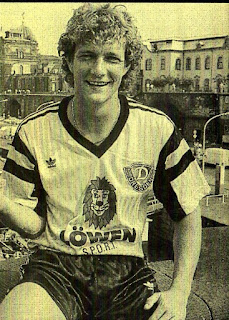1- England
and Germany Friendly-1935
This was the first match between the nations after rise
of the Nazis and Hitler in power in Germany.
This
match was scheduled to be held at Tottenham Hotspur’s White Hart Lane stadium.
Tottenham had a historically traditional jewish support. There were protests about this match and many wanted
the match to be boycotted.
TUC,
the largest Federation of Trade Unions became involved.
TUC
(Trade Union Congress) asked the Home Office to ban this match. On November 27,
1935, TUC formally requested the match to be called off. Two days later, the
government refused this request.
On
December 2, TUC had an audience with the Home Secretary to no avail.
The
match went ahead with no trouble with England winning (3-0) on December 4,
1935.
 |
Photo
From: Chronik des deutschen fussballs, 2005
(England Captain Edris Hapgood, Swedish Referee Otto Olsson and Germany Captain Fritz Szepan, December
4, 1935, England 3-Germany 0 ) |
2- Ruud
Krol and false letter to his daughter-1978
The
1978 World Cup was one of the most politically charged tournaments. In various
nations there were calls to boycott the tournament to protest the Videla
Regime. To put a positive face for the World, the magazine ‘El Grafico’
(through obvious governmental pressure) published an open letter on the June 13th
edition, that was allegedly written by Holland Captain Ruud Krol to his
daughter. In this letter, Krol is full of praise of the Argentinean hosts and
tells his daughter that everything is peaceful and ‘soldiers fire flowers from
their guns’.
Krol
denied having ever written that letter.
 |
Photo
From: Mondial, old series, issue 20, July 1978
(Ruud
Krol, June 2, 1978, World Cup, Holland 3-Iran 0)
|
3- Robert
Prosinecki and Yugoslavia 1991
When
the Yugoslavian conflict started in June 1991, it naturally effected the
National team as well.
In
the fall of 1991, Prior to Yugoslavia’s EC Qualifier vs. Faroe Islands on
October 16th, star midfielder Robert Prosinecki had to remove
himself from national team duty.
He
had been receiving death threats from Croatian extremists if he turned up for
the national team. It is important to remember that Prosinecki’s father was Croatian
and his mother was Serbian.
He
never played for Yugoslavia again and started playing for the new independent
Croatia in 1994.
 |
Photo
From: World Soccer, December 1990
(Robert Prosinecki with Red Star Belgrade) |
4- Torsten
Gutschow, 1992
Dynamo
Dresden striker Torsten Gutschow disclosed in early 1992 that during the
Communist era of East Germany, he had spied for the Secret Police Stasi.
He
spied on up to 60 people, including 10 of his teammates. Among others that he
had to spy on were Dynamo Dresden President Wolf-Rudiger Ziegenbalg, Dresden
manager Reinhard Hafner and even his future in-laws.
He
was approached when he was 17. He was in love and Stasi told him either he
would be a spy or would not see the woman he loved.
After
that at matches he was called ‘stasi pig’ and was ostracized, despite appeals
of calm from National team manager
Berti Vogts and Matthias Sammer. He left at the end of that season and joined
Turkey’s Galatasaray, but returned to Germany a year later.
 |
Photo
From: World Soccer, March 1992
(Torsten
Gutschow at Dynamo Dresden)
|
5- Sheikh
Fahad Ahmad Al Jaber Al Sabah, 1990
Sheikh
Fahad Al Ahmad Al Jaber Al Sabah was the Kuwait FA chief who during the 1982
World Cup match vs. France (June 21, 1982, World cup, France 4-Kuwait 1), came
onto the field and protested Alain Giresse’s goal and was successful in having
it disallowed.
The
Kuwaitis protested that they had stopped playing (and allowed Giresse to score)
after hearing a whistle (which had come from the crowd.)
For his interference an £8.000 fine was imposed
on the Kuwaitis by FIFA. When Saddam Hussein’s Iraq invaded Kuwait on August 2, 1990, he was killed in that first day defending the Dasman Palace.

goooooooooooooddddd
ReplyDelete==================
Vào Diễn Đàn Cá Cược Bóng Đá Bongdacacuoc.com để thảo luận về bóng đá, Luật Chơi Cá Cược và tìm hiểu các Nhà cái châu Á uy tín nhé !